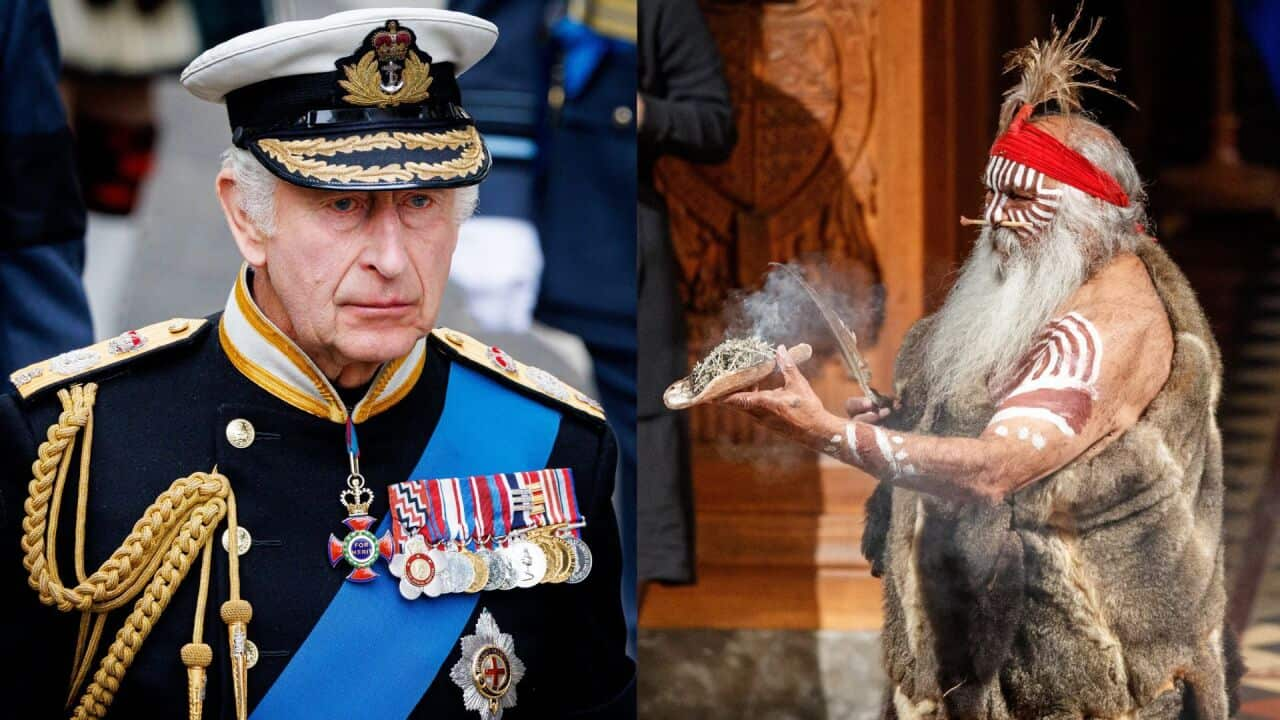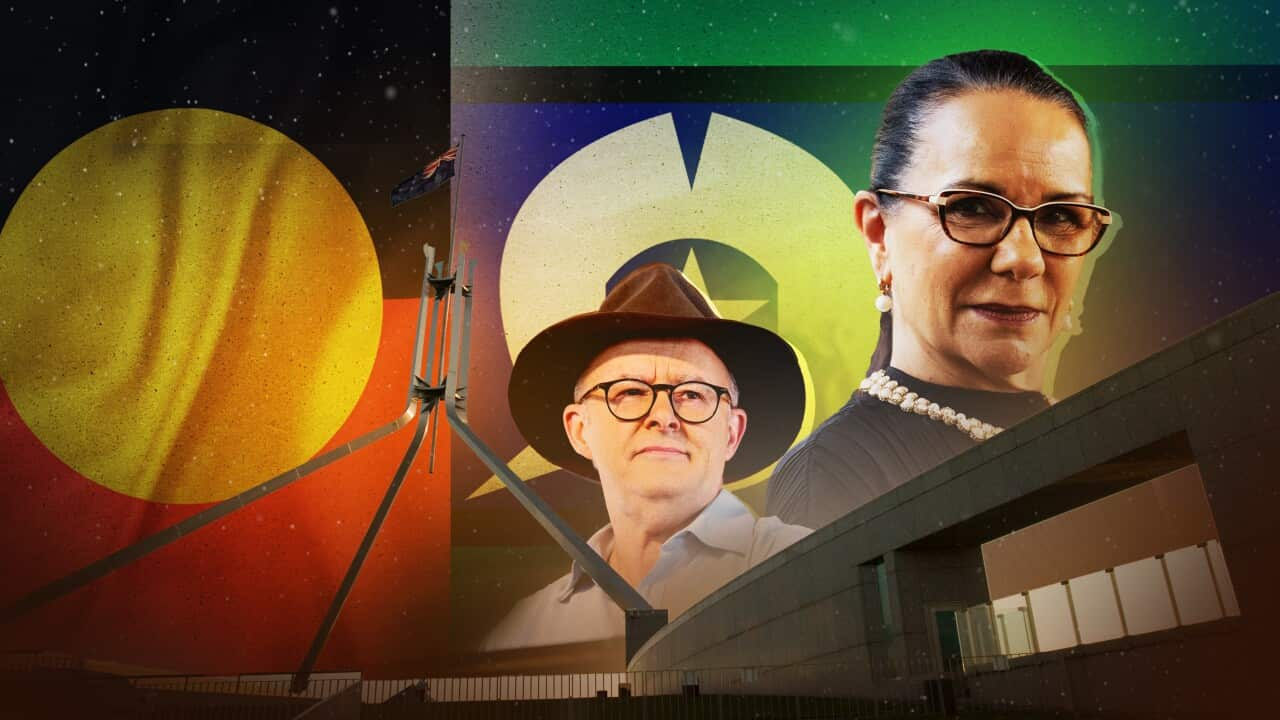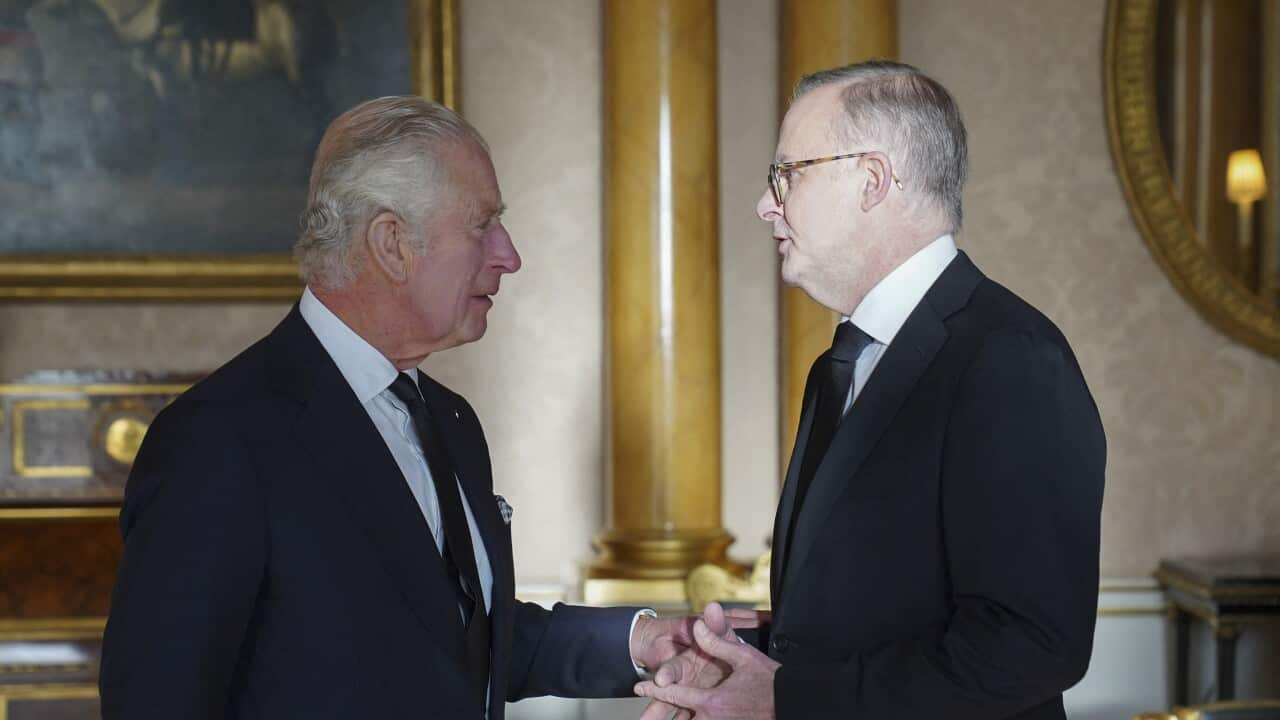Key Points
- Waleed Aly floated idea for replacing monarch with Indigenous head of state
- Some Indigenous leaders are open to the idea but have concerns, while the Republican movement is opposed
Now that the period of mourning for Queen Elizabeth II is over, debate is heating up about Australia's future, including whether it should become a republic.
Last week Waleed Aly, host of Channel 10 show The Project, floated the novel idea of replacing the British monarch - currently King Charles III - with a First Nations head of state in Australia, who would be appointed for life.
“If we’re going to do this, we need to draw on our own sources of tradition, ceremony, even spirituality," he said on the show.
However, there has been a mixed response to Aly's suggestion, with the Australian Republican Movement saying it does not support the idea and one Indigenous academic tweeting that it showed a lack of understanding of Aboriginal culture.
Other First Nations leaders are more open to the proposal but say the details could be difficult to get right.

Queen Elizabeth II and Prince Philip, Duke of Edinburgh attend the State Opening of Parliament in London in 2013. Credit: Getty
Meanwhile, Opposition leader Peter Dutton has said he wants Australia to continue as a constitutional monarchy.
What did Waleed Aly propose?
Aly said the Queen provided a sense of constancy, history and ritual - something that appointing a president would not be able to replicate.
He said the monarchy was powerful precisely because it had no real power.
“The Queen was loved because she was so frequently silent, so often a blank canvas,” he said.
But he said the power of the monarchy went beyond the personal.
"Every nation needs a 'we', a symbol that stands for the whole."
"The republican objection is mainly that the monarchy is the wrong symbol of the 'we.'
"That argument is sharpest coming from Indigenous Australians, for whom the crown isn't merely foreign, but dispossessing."
Aly said installing an Indigenous head of state would enable the pomp and ceremony associated with the royals to continue, with something more fitting in Australia but still magical.
“One of the great things about some Indigenous ceremonies like Welcome to Country, is that they’re often informal, " he said.
“This extraordinary mix of ceremony and informality captures something unique and charming about the Australian character, Indigenous and not.
“We could even call our elder 'Uncle' or 'Aunty', and when our Aunty dies, deep rituals of mourning would already exist, ready for us to embrace as a nation.”
Aly acknowledged the position would be "racially closed" but so was the monarchy, which was "always going to be white". He also noted Catholics could not become king or queen.
“Sure, I can see problems. For example, how would the elder be chosen from among the hundreds of First Nations we have? Does it rotate in a predetermined way?
“Our head of state has to be an apolitical figure, confining itself to speaking on areas of mere total agreement. Would the elder face too much pressure to become an activist?
“I admit it’s rough and has a lot of issues to work through but it captures something of the richness and magic of monarchy while being indisputably ours.”
Aly has welcomed feedback on the idea.
Indigenous governor-general could be a good start
Professor Marcia Langton, foundation chair of Australian Indigenous Studies at Melbourne University, said it was not the first time the idea of an Indigenous head of state had been raised as it had been discussed in the lead-up to the 1999 referendum on the republic.
Professor Langton said she was open to the idea but it would depend on what the criteria for appointing that head of state would be, or whether they would be elected.
She believes one of the reasons why the 1999 referendum failed was because Australians were worried One Nation leader Pauline Hanson, who was extremely popular at the time, could be elected as head of state.
"So the actual republican model is what's important to get right in the first instance ... and I believe the prime minister has also said .... we have to delay the republic debate until we deal with the Voice [to Parliament]."

Professor Marcia Langton Credit: BENT3LAND PRODUCTIONS
"The role of Elder properly speaking in Indigenous society is a customary role that is earned," she said. "It's not a hereditary role, it's partly hereditary, but the attributes of leadership have to be met, so all of those attributes have to be spelled out clearly if this proposal were to be pursued."
However, she said appointing Indigenous people to roles as state governors or the governor-general should be considered.
"Not since Sir Doug Nicholls [in 1976] has an Aboriginal person been appointed to one of these roles," she said.
Aboriginal elder, Professor Tom Calma, chancellor of the University of Canberra, is also supportive of having more Indigenous people appointed to governorship roles.

Professor Tom Calma is an Aboriginal elder from the Kungarakan tribal group and a member of the Iwaidja tribal group. Source: SBS News / Supplied
Professor Calma said he thought Aly's idea was "very aspirational" and also noted the process of succession for figures such as the Dalai Lama could be relevant. But he agreed the appointment of one person to the role of head of state would be a challenge as there was no one Aboriginal or Torres Strait Islander state.
"It's a good starting point for a discussion, and with a lot of these matters, there's got to be a lot of discussion and that's possibly where the challenge is," he said.
"As long as they don't take oxygen out of the Voice and the referendum discussions, they're all hand-in-hand."
Proposal shows 'lack of understanding'
However, Gomeroi woman and Macquarie University lecturer Dr Amy Thunig tweeted that people who were not members of the Indigenous community should not speak on behalf of the community unless directly asked to.
"Easy to ensure you’re not missing massive knowledge gaps before taking space on subjects on a national platform," she wrote.
Dr Thunig noted that proposing a singular elder to be ‘head of state’ reveals a "lack of knowledge & understanding of a) what Eldership is, & b) how leadership works within Indigenous cultures".
"It also reinforces a homogenisation of Indigeneity. If you don’t know this, mayyybe [sic] don’t publish on it?"
She said it was already difficult for Indigenous-driven and -led ideas to gain attention in the media and among political spaces.
"Adding your own voice - particularly when you have a loud, platformed voice - to the chatter, actually drowns out Indigenous voices & then gathers/steals support from non-indigenous people who otherwise may have been there to support our work, ideas & pathways."
Republican Movement rejects proposal
The Australian Republican Movement (ARM) has welcomed Aly's contribution to the debate and the sentiment behind it but does not support the proposal.
"We welcome the contribution to the debate as Australia considers how best to achieve its independence from the British monarchy and begins to address the injustices that have disenfranchised First Nations Australians," ARM national director and chief executive officer Sandy Biar told SBS News.
"We firmly believe that in a democratic country like Australia, our head of state should be chosen by Australians, elected by Australians and accountable to them. Any Australian should be able to aspire to be our nation's head of state.
"Our sovereignty should be invested in the Australian people. Australians do not need or want a King, or a king-like head of state."
The movement has announced it is resuming its campaign following the end of the mourning period for Queen Elizabeth II.
Events will now be held across the country as the movement ramps up its push for a republic.
“What we need now is for people to join us and get involved” said ARM chair Peter FizSimons.

Australian Republican Movement national chairman Peter Fitzsimons. Source: AAP / Dan Himbrechts
Indigenous Australians Minister Linda Burney, a Wiradjuri woman, offered her condolences to the late Queen's family, while acknowledging there had been a range of emotions among First Nations people following her death.
"For many Indigenous Australians, the legacy of the monarchy is fraught - a complex, difficult and painful reminder of the impact of colonisation," she told parliament.
"This week has seen many wrestling with the swirling emotions ... but equally there are many Aboriginal and Torres Strait Islander people that have respect for the Queen.
"The Queen's relationship with Indigenous Australians reflects both how far we have come and how far we still have to go."












